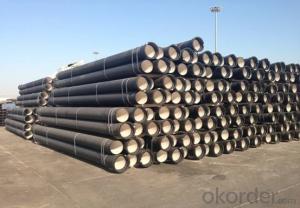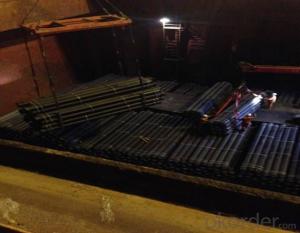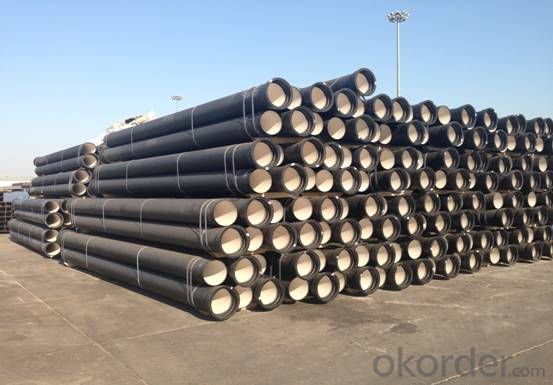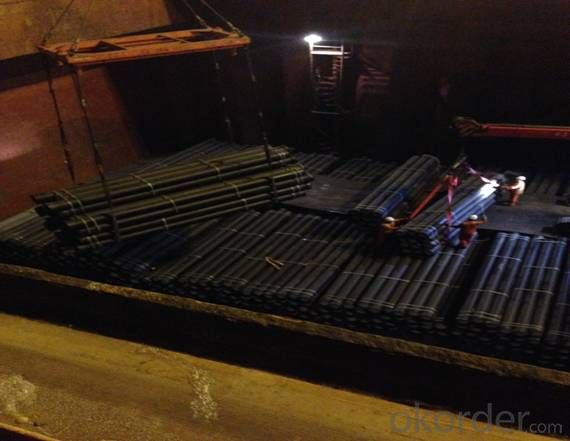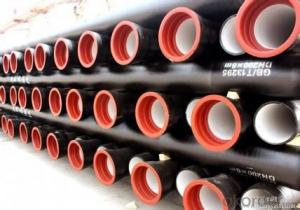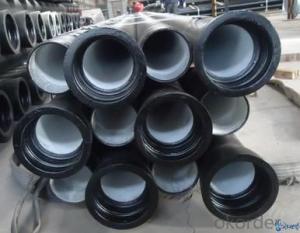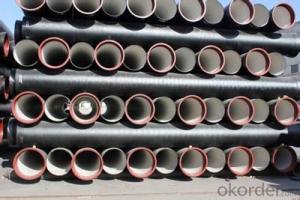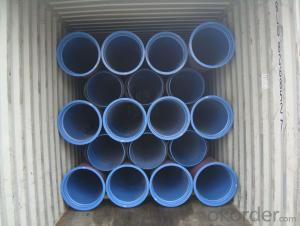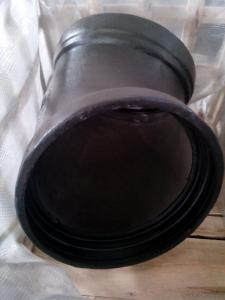DUCTILE IRON PIPE C Class DN100
- Loading Port:
- China Main Port
- Payment Terms:
- TT OR LC
- Min Order Qty:
- -
- Supply Capability:
- -
OKorder Service Pledge
OKorder Financial Service
You Might Also Like
Ductile Iron Cast Pipe is without any defects compare with tradition casting tech, which has many advantages particularly as follow:
(1) High density. In the "vertical upward casting" process, the melt iron of centre liquid column in center crystallizer is continuously feeding for volume shrinkage caused by condensation tube at outer circumference , which lead to be free of shrinkage porosity.
(2) High purity. When melt iron pouring, the mixed impurities such as gas, dross, sand grain which are lighter than melt iron could be eliminated at furnace mouth, its impossible to enter into the crystallizer through the channel, so the melt iron into the crystallizer is very pure.
(3) Strength with toughness. The cooling speed provided by continuous crystallizer is 30 times than sand casting and 5 times than centrifugal casting, and doesn't produce white iron, the eutectic cell volume of continuous cast iron is one eighth to one tenth compare with traditional cast iron. The density of graphite nodule in ductile iron can reach 300-700 pcs/mm2. Therefore, all reason above improve the strength and toughness of continuous cast iron.
(4) Free machining. The high speed cooling make the hardening phase (such as boride, steadite) not appear like reticular, massive or thick, but diffuse like fish bone and pane in shape, moreover, there are tiny graphite flakes inlaid hardening phase. It's free machining in BrinellHardness the range of 250-300HB. However, the Brinell Hardness of 250 is top limit to common metal materials.
(5) Uniform composition of tube wall. The convection mixing of liquid column caused by marching type drawing in crystallizer make the composition of tube wall well-distributed, and concentration gradient very little.
(6) High productivity. To the wall thickness of tube under 10mm, the speed of continuous casting is 1 meter/min, to the wall thickness of tube under 20mm, the speed of continuous casting is 0.5 meter/min, which is high efficiency that centrifugal or other casting tech couldn't reach.
- Q: How does ductile iron pipe perform in extreme temperatures?
- Ductile iron pipe is renowned for its exceptional performance in extreme temperatures, thanks to its unique composition and manufacturing process. Its structural integrity remains uncompromised, allowing it to endure both high and low temperatures without issue. When it comes to high temperatures, ductile iron pipe showcases remarkable heat resistance. It can withstand temperatures of up to 1000 degrees Fahrenheit, making it perfect for applications involving hot liquids or gases, such as steam pipelines or industrial processes. Its strength and thermal stability enable it to maintain its shape and structural integrity even under extreme heat conditions, guaranteeing long-term reliability and safety. Similarly, ductile iron pipe excels in low-temperature environments. It can brave sub-zero temperatures without becoming brittle or prone to cracking, a common problem with materials like cast iron. This makes ductile iron pipe an ideal choice for applications in cold climates, such as water distribution systems in freezing temperatures. Moreover, the ability of ductile iron pipe to resist thermal expansion and contraction is another advantage in extreme temperatures. It has a low coefficient of thermal expansion, meaning it expands and contracts less compared to other materials. This property minimizes stress on the pipe, reducing the risk of leaks or failures caused by temperature fluctuations. In conclusion, ductile iron pipe demonstrates outstanding performance in extreme temperatures. Its heat resistance, ability to withstand low temperatures, and resistance to thermal expansion and contraction make it a reliable option for various applications, ensuring safe and efficient operations even in challenging environments.
- Q: How does ductile iron pipe perform in areas with high soil erosion?
- Ductile iron pipe is renowned for its remarkable strength and durability, rendering it a dependable option for regions experiencing extensive soil erosion. With its distinctive composition, including graphite nodules, it possesses the capacity to be both pliable and resistant to fractures or cracks, even in demanding environments. Consequently, ductile iron pipe is highly capable of enduring the impact of soil erosion. In regions with high soil erosion, the surface of the pipe can potentially be scraped by soil particles, leading to abrasions or damage. However, ductile iron pipe's substantial wall thickness and corrosion-resistant coating effectively serve as a barrier against these abrasive forces. Consequently, even in regions with considerable soil erosion, ductile iron pipe can maintain its structural integrity and functionality. Additionally, the ability of ductile iron pipe to resist corrosion further augments its performance in areas with high soil erosion. Soil erosion frequently results in increased moisture content, which can expedite the corrosion process for certain materials. Nonetheless, ductile iron pipe's protective coating, typically composed of zinc or epoxy, acts as a shield against corrosion, ensuring prolonged performance and reliability. To summarize, ductile iron pipe exhibits exceptional performance in regions with high soil erosion due to its strength, flexibility, and resistance to fractures or cracks. Its substantial wall thickness and corrosion-resistant coating make it highly durable against abrasive forces and corrosion, enabling it to withstand the challenges posed by soil erosion. Consequently, ductile iron pipe is a dependable choice for infrastructure projects in these areas, offering long-lasting and efficient water and wastewater transportation systems.
- Q: What is the expected hydraulic efficiency of ductile iron pipes?
- Several factors, including pipe diameter, roughness of the pipe surface, flow rate, and length of the pipe, can affect the expected hydraulic efficiency of ductile iron pipes. However, it is generally acknowledged that ductile iron pipes exhibit exceptional hydraulic efficiency. Ductile iron pipes possess an inner surface that is smooth, thereby reducing frictional losses and facilitating efficient water flow. The smoothness of the pipe surface serves to minimize energy losses caused by turbulence and resistance. Furthermore, ductile iron pipes are engineered to maintain a consistent and uniform internal diameter, which further enhances their hydraulic efficiency. Research has demonstrated that hydraulic efficiencies of ductile iron pipes can range from 85% to 95%. This indicates that a significant portion of the energy inputted into the system is effectively transferred to the water, resulting in minimal losses. It should be noted that the hydraulic efficiency of ductile iron pipes can be influenced by factors like corrosion, scaling, and sediment accumulation over time. Regular maintenance and appropriate cleaning procedures can help preserve the hydraulic efficiency of ductile iron pipes. In summary, ductile iron pipes are widely regarded for their high hydraulic performance and are extensively utilized in water distribution systems due to their ability to convey water with minimal energy losses.
- Q: What are the different coating thickness options for ductile iron pipe?
- The coating thickness options available for ductile iron pipe can vary depending on the specific application and requirements. Typically, there are three commonly used coating thickness options for ductile iron pipe: 1. Standard Thickness: Normally, the coating thickness for ductile iron pipe falls within the range of 200 to 250 microns (8-10 mils). This thickness is generally sufficient to protect against corrosion and abrasion in most soil and water conditions. 2. Increased Thickness: In certain cases, when the pipe is exposed to more aggressive environments or requires a longer lifespan, it may be necessary to use a thicker coating. This can range from 300 to 500 microns (12-20 mils) or even more, depending on the specific requirements. 3. Specialized Coatings: For particularly demanding applications, specialized coatings may be utilized. These coatings offer even greater protection against corrosion, abrasion, or chemical exposure. The thickness of these specialized coatings can vary significantly depending on the specific coating material and application requirements. It is important to emphasize that the selection of coating thickness should be based on a comprehensive evaluation of the environmental conditions, intended lifespan, and any relevant industry standards or specifications. It is advisable to consult with a coating manufacturer or corrosion specialist to determine the appropriate coating thickness for a specific ductile iron pipe application.
- Q: What are the different joint types available for ductile iron pipe?
- The different joint types available for ductile iron pipe include push-on joints, mechanical joints, restrained joints, and flanged joints.
- Q: What is the maximum temperature that ductile iron pipe can handle?
- The maximum temperature that ductile iron pipe can handle depends on various factors such as the specific grade of ductile iron, the duration of exposure to high temperatures, and the presence of any external factors like corrosive environments. Generally, ductile iron pipes can handle temperatures up to 400-450 degrees Fahrenheit (204-232 degrees Celsius) for short durations. However, it is important to consult the manufacturer's specifications and guidelines to determine the specific maximum temperature limits for a particular grade of ductile iron pipe. Additionally, it is recommended to consider the effects of thermal expansion, potential loss of mechanical properties, and any additional protective measures that may be required at elevated temperatures.
- Q: Can ductile iron pipes be used for conveying gases?
- Indeed, gases can be conveyed using ductile iron pipes. Ductile iron, renowned for its strength and durability, is capable of enduring high pressures and temperature fluctuations, rendering it appropriate for gas transportation. Furthermore, ductile iron pipes possess exceptional resistance to corrosion, a crucial attribute when handling potentially corrosive gases. Nevertheless, it is of utmost importance to verify the compatibility between the specific gas being conveyed and ductile iron, in order to avert any chemical reactions or pipe damage. To ensure the secure and efficient conveyance of gases through ductile iron pipes, one must carefully consider proper engineering design and material selection.
- Q: Can ductile iron pipes be used for both water and sewer applications?
- Yes, ductile iron pipes can be used for both water and sewer applications. Ductile iron pipes have excellent strength, durability, and corrosion resistance, making them suitable for carrying both water and sewage. They are commonly used in various water supply and wastewater systems due to their ability to withstand high pressure and resist chemical reactions caused by sewage.
- Q: How do ductile iron pipes handle ground settlement due to construction activities?
- Ductile iron pipes have the ability to handle ground settlement caused by construction activities due to their flexibility and strength. These pipes are designed to withstand external pressure and can accommodate minor ground movements without significant damage or failure. The ductility of the material allows the pipes to deform slightly, absorbing the ground settlement and preventing them from cracking or breaking. Additionally, the joints in ductile iron pipes are typically flexible, allowing for further movement and reducing the risk of leakage or structural issues. Overall, ductile iron pipes are well-suited for withstanding ground settlement and ensuring the integrity of the pipeline system during construction activities.
- Q: Can ductile iron pipes be used for pressure surge applications?
- Yes, ductile iron pipes can be used for pressure surge applications. Ductile iron pipes have excellent strength and durability, making them suitable for handling surge pressures caused by sudden changes in flow rates or water hammer events. They can withstand high internal pressures and have a high resistance to impact and fatigue. Additionally, ductile iron pipes have a smooth interior surface that allows for efficient flow of fluids, minimizing the potential for pressure surges. However, it is important to consider factors such as pipe size, wall thickness, and proper installation techniques to ensure the pipes can safely handle the specific pressure surge conditions in a given application. Consulting with a professional engineer or pipe manufacturer is recommended to determine the suitability of ductile iron pipes for pressure surge applications.
Send your message to us
DUCTILE IRON PIPE C Class DN100
- Loading Port:
- China Main Port
- Payment Terms:
- TT OR LC
- Min Order Qty:
- -
- Supply Capability:
- -
OKorder Service Pledge
OKorder Financial Service
Similar products
Hot products
Hot Searches
Related keywords
